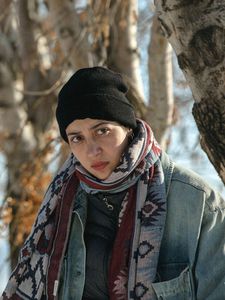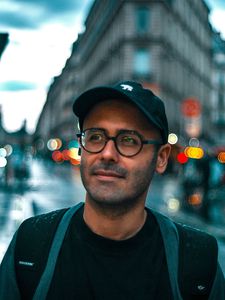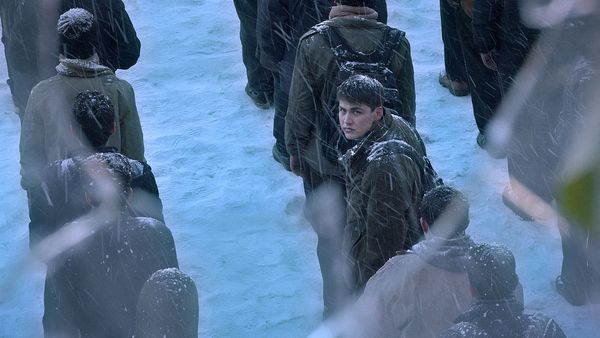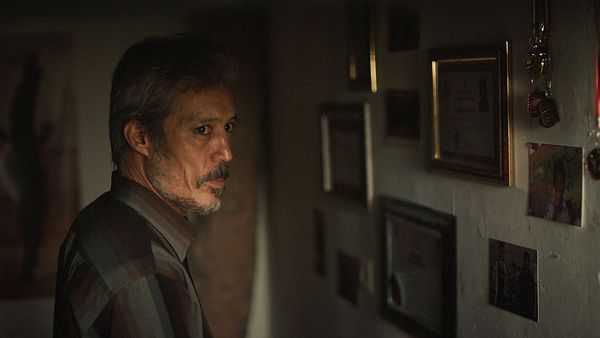Tell us about how you came to collaborate.
Raha Amirfazli: Ali and I were studying in the same university and he was three years above me. And we started working together. First, I started working on his films, as an assistant and as a costume designer. And then, as we progressed, we kept working together on short films that we made, until we decided to make Solar Eclipse together, which is our latest short film. And we saw that that collaboration works very well between us. And that's how we came to direct the featue together.
 |
| Director Raha Amirfazli Photo: Courtesy of Sundance Institute |
Alireza Ghasemi: It has an interesting story. It was the beginning of Covid and there was a curfew. And then we decided to do nothing and related to film because it was very hard. It was after us making Solar Eclipse. And I remember that Raha had a home office back in Iran. And we had this meeting, watching films, reading books, talking about things. And then we had this idea about this film, and he started to evaluate it during our discussions, and then we decided to write it down. Then we noticed, okay, this is going to be a good feature film. So let's do it. And then we started to rewrite. And I think we had a lot of rewriting.
Then when you're on the set,how does that work as a sort of team of directing? Presumably you have to both be realy in sync?
RA: Yeah, absolutely. Both of us like doing very lengthy pre-production. And that is when we come to the same idea of how the film is going to be. We have meetings between the two of us, with our key crew members, and our actors. Both Ali and I are very careful with our actors and the acting of the film is very important. Based on our personal relationship with the actor, who the actor connects to more, who they will trust more in a certain scene for the film, we split our responsibilities. So we decided on that scene, Ali's going to work with the actors, and I worked with the DP and costume. And we split like that based on the scenes that we're shooting.
This film lends itself to being split up in a way because although it has that sort of overarching story that you're telling, you also have those segments within it. Did that make it a little bit easier in terms of deciding who was going to be doing what?
AG: That's true. The different segments led us to do our shooting in different periods of time. And I think during that time you (Rana) started to be more experienced about the situation, how we needed to collaborate with people and what the dynamic was between us. Sometimes I was more in charge of leading the actors and Raha was in charge of dealing with the cinematographer. And some days we just flipped the whole thing. It was like a game. It was very challenging, but it was very joyful and beautiful.
Can we talk a little bit about the cast because most of them are relative newcomers to the business? So you're working with people who may be not so used to being in front of a camera before. So was there quite a lot of rehearsal time? And tell us about the casting
RA: So with the actors, we got very lucky to get connected to a local, small business that worked with Hazara people in Tehran [an ethnic group principally composed of Afghans]. Because our actors are very interested in film and theatre, they work with them to learn how to act. And we got very lucky to find that person who was the instructor and we found many of her cast through them.
We also had a lot of rehearsal time. And some of that was actually in very bizarre situations, because they were also working. So we would meet in circumstances like in parks to rehearse but we did do a lot, a lot of extensive rehearsal sessions.
This subject of Afghan migrants in Iran is going to be more familar to a domestic audience, where internationally maybe people are less aware of it. Do you hope to start a dialogue in Iran with this film? Or is it more or for you about telling the rest of the world about this situation?
AG: I think it's both of those. The first thing that keeps us motivated to tell the story is the current situation in Iran because it's a long story of refugees coming to Iran. And there are a lot of sad, or sometimes sweet stories about their situation. So it started like that. And then Raha moved to New York, and I moved to Paris, so we are kind of like immigrants now ourselves. And I was watching the film for the 100th time last week, and I noticed that I understand the film way better, compared to the two years ago, when we then we wrote it, because I kind of feel it more. If I knew the situation two years ago, now I can feel it. So I think personally, and for Raha also, it's more universal to us now.
The time period of this film is interesting as well, this idea of something unfolding over 30 years because often films about refugees tend to be very short-term movies - it's about the journey there, it's the immediate aftermath or the run-up to the move. Whereas I feel like you were much more interested in sort of looking at the kind of system these people are entering into, and then almost can't escape.
RA: Yes, absolutely and exactly for the Afghan refugees of Iran, because there's no clear or easy way for them to get Iranian citizenship. You cannot tell this story within ten years of someone coming to Iran and trying to get citizenship and trying to improve their lives. And also the bigger picture of the three episodes that might not be caught very easily is that this film starts with the US invasion of Afghanistan and ends when the US military leaves. So it's the 30-year span that is actually shown.
Will it be screened in Iran
AG: We’ll do our best to make that happen. I think it's important because at the moment, we feel the racist behaviour toward this community is increasing a lot for many different reasons. I notice a lot of disinformation happening on social media against those people. And we really want to showcase this film in Iran to bring some insights to the audience.
Did you speak to a lot of people who have made this journey as part of the writing process?
 |
| Director Alireza Ghasemi Photo: Courtesy of Sundance Institute |
The film also highlights the class system. Again, people perhaps associate certain films with Iran that don’t always portray the middle classes. It’s interesting that you chose to root part of the story in that world.
RA: Yes, and because the upper middle-class in Iran is the class that thinks of emigrating to other countries we thought it would be a very interesting correlation between the Iranian family and the Afghan family living in their house to actually interact with each other. In recent years, many of the middle class in Iran have thought about migration as well.
The score helps to bring the stories together, how did you come to collaborate with the composer Frederic Alvarez?
AG: I met Frederic on Facebook. He sent me a letter, he watched one of my films, called Lunch Time, and he wrote to me on Facebook, about a potential collaboration. And when I was working with Raha on the script, I told her, “Maybe we can show the script to him”. And before we started development, Fredric read the script and made some sketches, which are still in the film, and we did our rewriting based on some of his sketches. So he was with us from the start of the journey and it was very helpful. Because, you know, usually composers come in post production. This time we had him from development even before that at the script stage.
Presumably you're thinking you might work again, together having had such a sort of successful short film and now and now feature. Is there anything that you think that you'll take forward, particularly from this project?
RA: I know that both me and Alilike films that speak about being othered, and being an underdog, and we work very well together on scripts, and as directors, so I think that would be something that we will take away from the film, and we will have that concept in our future films, as well.
AG: First of all, I really like the idea of collaboration, especially with Raha. I think, we had a lot of interesting moment when we did not agree on some concepts, or I don't know, some camerawork or some acting. But I think the collaboration makes us come up with the synthesis. The most interesting part of this collaboration was that the result was something that I couldn't imagine. It was higher than my expectation and this is something that I really want to happen again in the future. And if I want to do something different, maybe it's going to make our producers crazy saying this, but longer pre-production. Yeah, we had a very long pre-production but I think I'm really into longer ones, because it helps a lot.























